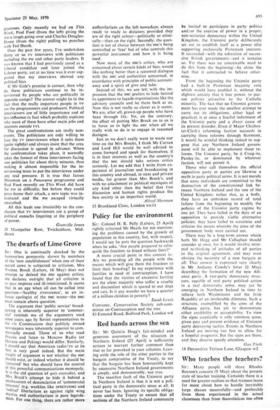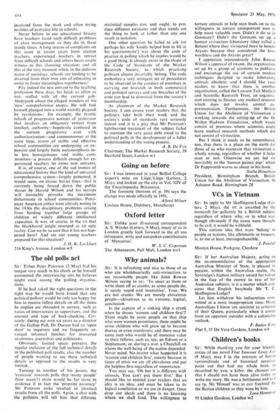Who teaches the teachers?
Sir: Many people will share Rhodes Boyson's concern (9 May) about the present state of teacher training. Certainly there is a need for greater realism so that trainees learn far more about how to handle inevitably large classes successfully—and preferably from those experienced in the actual classroom than from theoreticians too often insulated from the stark and often trying realities of everyday life in schools.
Never before in our educational history have teachers faced such difficult problems of class management as they do in these trendy times. A long stream of complaints on this score in recent yeafs from student teachers, experienced teachers in retreat from difficult schools and others bears ample witness to this alarming situation; and all this at the very moment when, in the dubious name of sociology, schools are tending to be diverted from their true aim of educating in order to foster meaningless togetherness!
Pity indeed the new entrant to the teaching profession these days, his head, as often as not, stuffed with all the current gob- bledygook about the alleged wonders of the 'new' comprehensive utopia. He will find himself plunged into a world weirdly plagued by revolutions: for example, the frantic rehash of progressive notions of yesteryear that involves an obligatory retreat from intellect, authority—hopelessly confused in the current progressive cant with authoritarianism—and commonsense; at the same time, scores of stable and effective school communities are undergoing an ex- pensive and largely futile metamorphosis in- to less homogeneous and stable com- munities—a process difficult enough for ex- perienced teachers let alone new entrants.
It is, of course, one of the sad ironies of educational history that the kind of universal comprehensive system—largely patterned, it would seem, on classic Soviet lines—that is currently being forced down the public throat by Harold Wilson and his satraps will inevitably provoke the maximum disharmony in school communities. Perci- pient American critics were already noting in the 1930s the disciplinary problems arising from herding together large groups of children of widely different intellectual capacities. It was, of course, in the us that the blackboard jungle emerged as an ugly reality. Can we be so sure that it has not hap- pened here? And are our young teachers prepared for this situation?



































 Previous page
Previous page